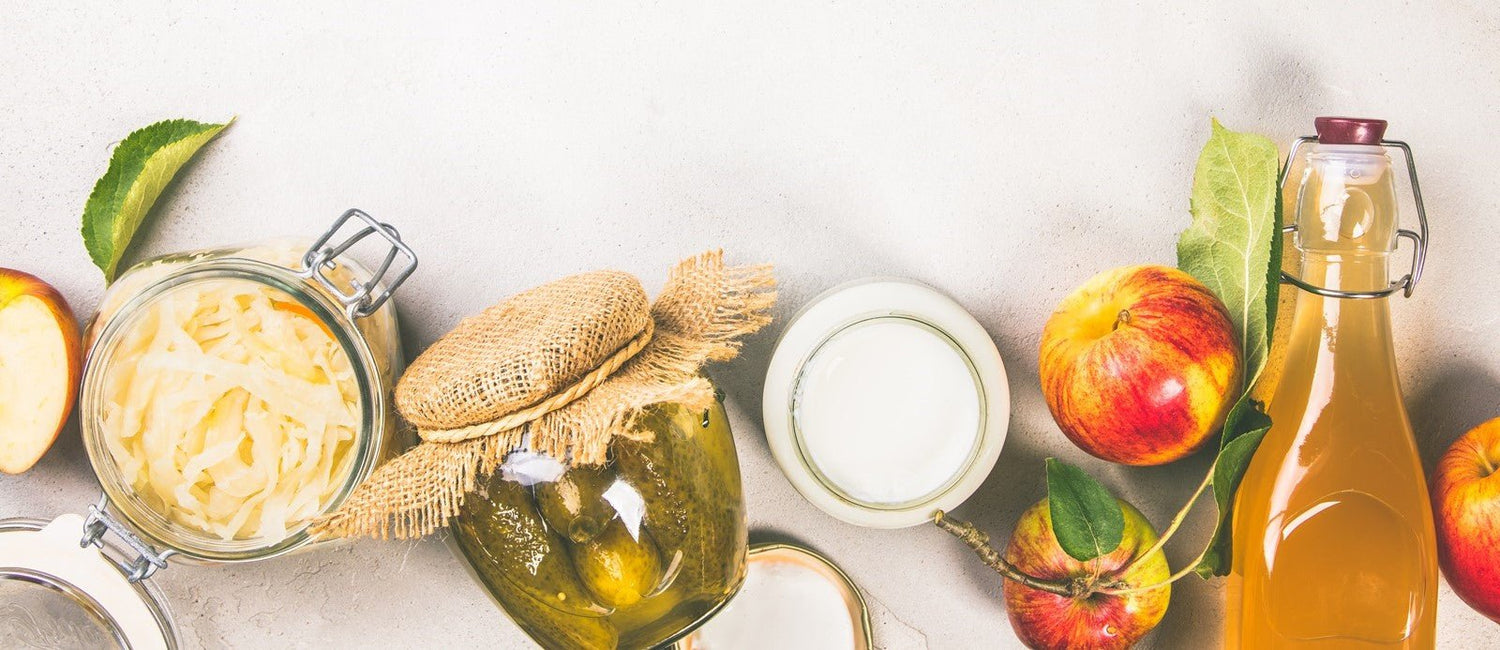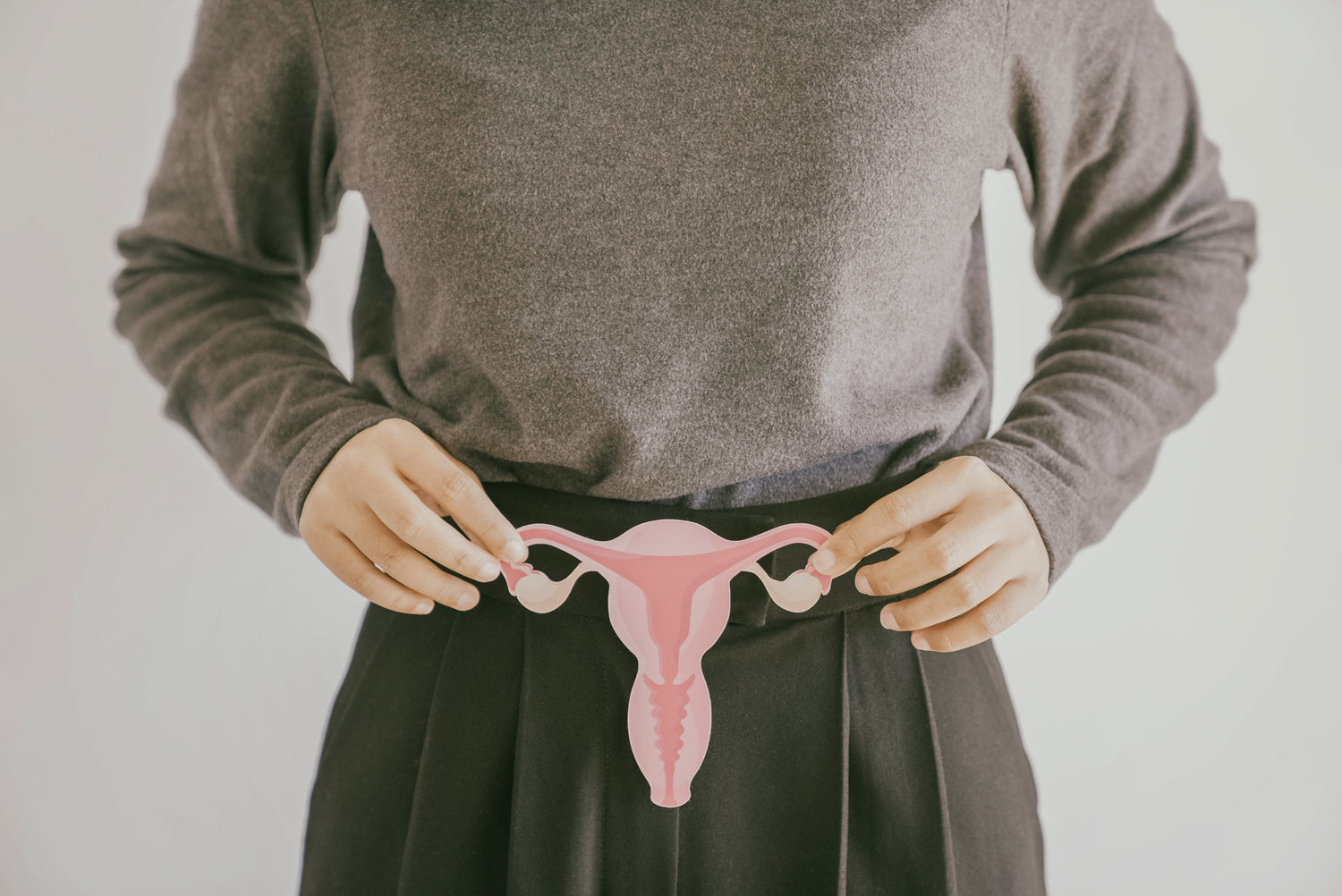Table of contents
- Gut-friendly diet
- A gut-friendly diet, what is that anyway?
- Why is proper nutrition so important for a healthy gut?
- The most important components of a gut-friendly diet: fiber and other indigestible food components
- Pre- and probiotics:
- Varied & balanced
- Plant-based foods
- Healthy fats
- These food components can cause an imbalance in the intestines:
- Microbiome food – recipes for your intestinal bacteria:
Gut-friendly diet
Many people are making it their New Year's resolution to eat healthier. Unfortunately, this resolution is usually discarded after just a few days to weeks. This is often not due to a lack of discipline, but simply due to the wrong approach. Many people have the feeling that they are only allowed to eat salad and have to do without a lot of things. Abstinence and certain deficiencies create cravings and the result can be real binge eating. This is where a vicious circle begins.
A healthy diet is not a diet, but a long-term diet. A gut-friendly diet can help keep the gut and therefore the entire body healthy. A gut-friendly diet is not a diet and has nothing to do with going without.
But what exactly is a gut-friendly diet and what should you pay attention to?
Is a gut-friendly diet just for people with digestive or intestinal problems?
We clarify!

A gut-friendly diet, what is that anyway?
By a gut-friendly diet we mean a long-term diet that, above all, provides the best possible care for the intestinal microbiome. The intestinal microbiome includes all the bacteria and living organisms in our intestines. A healthy microbiome is the key to a healthy gut and a healthy body. The bacteria influence metabolism and body weight, mental and physical well-being, how food is consumed, whether there is a tendency to diarrhea, constipation or flatulence, how powerful the immune system is, and the progression and development of chronic diseases such as type 2 diabetes and Alzheimer's as well as inflammatory bowel diseases such as leaky gut and irritable bowel syndrome. In addition, the microbiome influences skin, liver, heart and joint health, as well as inflammation.
A gut-friendly diet is not only used for people who are affected by intestinal diseases or who suffer from intestinal problems. Through a gut-friendly diet, illnesses can be prevented and quality of life can be increased through more energy and improved general health.
Why is proper nutrition so important for a healthy gut?
Diet has a direct influence on the composition of the microbiome and is one of the most important factors for healthy intestinal flora and intestines.
It's not just our body that needs nutrients from our food to stay healthy. Certain nutrients are also absolutely necessary for the 10,000 creatures in our digestive tract to ensure their survival and growth.
A healthy microbiome can be built and maintained through proper nutrition.

The most important components of a gut-friendly diet: fiber and other indigestible food components
By consuming fiber and other food components that are indigestible for the human body, a healthy balance of the microbiome can be maintained. Many health-promoting bacteria feed on indigestible food components and convert them into short-chain fatty acids such as butyrate, acetate and propionate.
These fatty acids have many positive effects on the intestines and the entire body. Butyrate is an important substance for keeping the mucosa (intestinal lining) healthy and has an anti-inflammatory effect. Acetate and propionate are absorbed into the bloodstream and are required for fat, glucose and cholesterol metabolism.
Regular consumption of fiber can increase the growth of beneficial bacteria. The result is an increased production of health-promoting short-chain fatty acids.
Fiber can also help eliminate toxins from the body, prevent digestive problems such as constipation, reduce inflammation, and prevent food cravings and rapid increases in blood sugar.
If too little fiber is consumed in the diet, the intestinal barrier can thin. The growth of the bacterium Bacteroides thetaiotaomicron A low-fiber diet encourages parts of the intestinal mucosa to metabolize and therefore thin out.
Good sources for fiber are:
- Whole grain cereals
- legumes
- vegetables and fruit
- Nuts and seeds
Pre- and probiotics:
Prebiotics and probiotics can also have a very positive influence on intestinal health.
Under Prebiotics refers to foods that contain plant fibers that cannot be digested by the human digestive tract. Similar to fiber, these fibers are first fermented in the large intestine by the bacteria resident there and serve as food for them. Prebiotic foods include: chicory, artichokes, bananas, oats, barley, garlic, asparagus, leeks and dandelion leaves.
At the term Probiotics Many people immediately think of nutritional supplements in capsule or powder form. But there are also natural probiotics. Probiotic foods contain living organisms that are beneficial for health. These microorganisms can pass through the digestive tract alive and accumulate in the large intestine. This allows the proportion of health-promoting intestinal inhabitants to be increased and dysbiosis (= imbalance in the intestinal flora) to be counteracted. Probiotic foods include: yogurt, fermented foods and drinks such as sauerkraut and kombucha, vinegar and cheese.
Varied & balanced
One of the most important factors in a gut-friendly diet is a diet that is as varied and balanced as possible. By eating a wide variety of foods, a high level of diversity can be built up in the intestines. One speaks of high diversity when there are many different microorganisms in the intestine. This has a positive effect on the intestines.
A one-sided diet means that only certain bacteria are fed while others are starved. This can greatly reduce diversity and lead to a variety of digestive and intestinal problems.
Plant-based foods
Your intestines can particularly benefit from a high plant content. In addition to the fiber they contain, plant-based foods such as vegetables and fruit also provide important vitamins, minerals and other bioactive substances that can perfectly support your intestines.
In addition, consuming plant-based protein such as pea protein promotes the growth of bifidobacteria and lactobacilli in the intestines. These bacteria increase the production of health-promoting short-chain fatty acids.
Healthy fats
Not all fat is the same. While saturated fatty acids and trans fats should not be consumed excessively in a gut-friendly diet, unsaturated fatty acids are absolutely necessary for your body and must be consumed with food.
Omega-3 fatty acids in particular can ensure a healthy composition of the microbiome and promote the production of anti-inflammatory substances. Good sources of Omega-3 are: linseed oil, fatty fish such as salmon, trout and mackerel, algae oil and chia seeds.

These food components can cause an imbalance in the intestines:
A gut-friendly diet is not a diet where you have to completely avoid certain foods. However, it is very beneficial for the intestines not to eat certain food components in excess.
Excessive consumption of the food ingredients mentioned below can lead to the spread of unfavorable bacteria or cause an imbalance in the intestines, which can weaken the intestinal lining and promote inflammation.
- Saturated fatty acids and trans fats
- Highly processed foods and products
- Simple sugars and refined sugars
- Additives such as artificial sugar substitutes, preservatives and emulsifiers
- High salt consumption
- High alcohol consumption m

Microbiome food – recipes for your intestinal bacteria:
Diet forms the basis of a healthy microbiome. If you give your intestinal bacteria the right food, you will contribute to a healthy balance in your microbiome and help you feel better.
Since we know how difficult it can be to get gut-friendly recipes from the Internet, for example, we have created a recipe book for you. This saves you a long time searching for suitable recipes and gives you access to a selection of wholesome, gut-friendly dishes and desserts for every occasion.
In addition to the delicious recipes, you will also receive additional nutritional knowledge and an introduction to fermentation. For example, you will find out whether cholesterol is good or bad for your body, how we can increase our iron absorption in the body and whether shade plants such as potatoes and eggplants can have a toxic effect.
You will also receive the best tips for a gut-friendly diet in everyday life from the myBioma founders Dr. Barbara Sladek and Dr. med. univ. Nikolaus Gasche!
We want to prove that a gut-friendly diet is easy to implement and absolutely not boring!
You can find the direct link to the eBook and 40 delicious recipes here: Microbiofood – recipes for your intestinal bacteria
On our blog you will find more exciting articles about the microbiome, the intestines and intestinal-friendly nutrition. You might also be interested in: Sugar & microbiome: the fatal effects
Note
This article is intended for informational purposes only and should not be construed as medical information or instructions. The recipes are intended for inspiration and are not intended as therapeutic measures. If you have any health problems, we recommend that you contact a doctor or other expert immediately.
References
- Deutsche Gesellschaft für Ernährung. Mehr Ballaststoffe bitte! Ballaststoffzufuhr lässt sich im Alltag leicht steigern. DGE (2012). https://www.dge.de/presse/pm/mehr-ballaststoffe-bitte/?L=0&cHash=de74871cb8220ba3050ddd99040f0831
- Gentile, C. L., & Weir, T. L. The gut microbiota at the intersection of diet and human health.Science (2018),362(6416), 776–780. Doi: https://doi.org/10.1126/science.aau5812
- Gill S K, Rossi M, Bajka B, Whelan K. Dietary fiber in gastrointestinal health and disease. Nature Reviews Gastroenterology & Hepatology volume 18, pages 101–116 (2021). Doi: 10.1038/s41575-020-00375-4
- Hinterberger C. Darmgesundheit und Ernährung. Ein gastrosophisches und ernährungsmedizinisches Therapiekonzept. Universität Salzburg (2018). https://eplus.uni-salzburg.at/obvusbhs/content/titleinfo/2795402/full.pdf
- Holscher H D. Dietary fiber and prebiotics and the gastrointestinal microbiota. Tylor & Francis Online 8:2, 172-184. Doi: 10.1080/19490976.2017.1290756
- Rinninella, E., Cintoni, M., Raoul, P., Lopetuso, L. R., Scaldaferri, F., et al. Food Components and Dietary Habits: Keys for a Healthy Gut Microbiota Composition.Nutrients (2019),11(10), 2393. Doi: https://doi.org/10.3390/nu11102393
- Sánchez-Tapia M, Tovar A, Torres N. Dieta s a Regulator of Gut Microbiota and its Role in Health and Disease. ScienceDirect 50, 259-268 (2019). Doi: https://doi.org/10.1016/j.arcmed.2019.09.004





